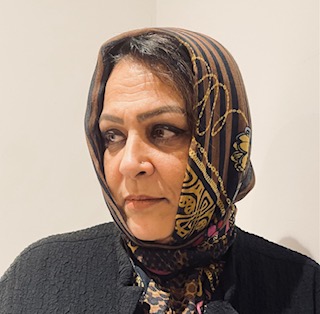
Bushra Ahmed
Founder West Croydon Voice; trustee of Lloyds Bank Foundation, 50:50 Parliament and HomeStart UK
Best known for founding the campaign group West Croydon Voice, community activity Bushra Ahmed, is also a highly experienced and highly regarded board trustee and businesswoman.
Following the destruction of her family business in the 2011 riots, Bushra founded West Croydon Voice to fight for the victims’ rights to compensation. She brings this lived experience of community cohesion and resilience, as well as diversity, equity and inclusion, and cultural awareness to her roles as a trustee of the Lloyds Bank Trust and HomeStartUK.
Bushra joined Rachel Tranter, Women on Boards Founding Director, at a recent Member Check-In event, to share her experience and advice for women who want to take their first steps as board members, as well as advice for organisations on how to be more inclusive.
In this inspiring session, Bushra shares how valuable our individual experience is as a board member and how it can make a difference to the people you represent. Bushra’s passion and belief throughout the interview demonstrate the driving forces behind her success as a campaigner and board member.
The power of seeing things differently
As a hijab-wearing Muslim woman, Bushra is more than aware of how she is perceived by the traditional board setup and has worked tirelessly to make the change necessary so boards can be truly representative of the people they speak for. She has come up against many boards and directors resistant to change and not recognising the value of having people who look like her on their boards.
As she explains: “The challenge is that if you have somebody like me on a board, we see things differently. If the way I see things is seen as hostile or challenging, it’s because it’s shaking your status quo and making you think.”
Bushra also talks up the true power in seeing things differently and coming from a different lived experience. From a non-academic background she highlights the benefits this brings as she offers something a perspective many boards are lacking. As she says: “Because I haven’t been told that I shouldn’t do something like you say. Think outside the box. I’ve never been in the box. I was never trained in the box, so I don’t know what the box tells me not to do. I’m quite happy to ask and to say things because I don’t have a box for reference.”
Recognising what your own experiences can offer, and that what you have to say and contribute is just as valuable as the next person is key. As Bushra puts it: “It’s not about…how educated you are. It’s about your commitment to that board and the passion that you bring”.
Getting the best out of diverse board members
Of course, diversity is not enough by itself – effective inclusion is needed to truly draw out the benefits. “If you want to bring people on your board, make sure you’re going to welcome them, make sure you feel as if they belong. If they feel as if they belong, you will get so much more out of those people.
You will get their skills, their value, their experience, and everything that they can bring. But if they’re sitting there silently because they’re not feeling welcome or they’re not feeling valued, what’s the point of having them? Eventually they just silently leave”.
Similarly, she highlights the importance of recognising lived experience and the valuable skills within this. She asserts that yes, a board may have members with experience in the business world or the education world, but it may not have the outside experience which will truly inform what you do and what the community truly needs.
Bushra further confirms that those board meetings where everyone has spoken up are by far the most beneficial and lead to more productive results and conclusions for the whole organisation.
Tips for prospective board members
Bushra’s is hugely encouraging to anyone who wants to take that step into the boardroom- you do have experiences and skills to offer the right board.
For those looking for their first appointment, she suggests: “Look for boards that want to open up. Sometimes they will mention that they are looking for diversity. Whether that’s bringing women in or women of colour, people with disabilities, LGBTQ, or whatever it is, look for organisations that are slightly open, because if you’re going into an organisation that literally isn’t even looking for it, it’s really difficult.”
Bushra also highlights the importance of recognising and believing in the equality all board members share, simply put “you are all there of equal value”. All board members have the same power to speak and share their points and bring what they want to bring to the table.
